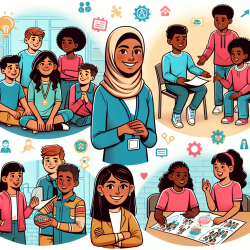Introduction
In the realm of education, leadership is not just a trait reserved for adults. It is a valuable skill that can be nurtured in children, fostering both academic and personal growth. The recent study, "Investigating the direct and indirect effects of a school-based leadership program for primary school students," explores the efficacy of the 'Learning to Lead' (L2L) program. This innovative initiative empowers older students to lead and mentor their younger peers, creating a ripple effect of positive outcomes across the school environment.
The Power of Peer Leadership
The L2L program is a peer-led initiative where students aged 10 to 12 (peer leaders) are trained to deliver a fundamental movement skills (FMS) program to younger peers aged 8 to 10. This approach not only enhances the leadership skills of the older students but also boosts the physical activity levels and movement skills of the younger participants. The program is grounded in transformational leadership theory, which emphasizes the role of leaders in inspiring and motivating others.
Key Outcomes of the Study
- Leadership Effectiveness: Peer leaders showed significant improvements in their leadership effectiveness, self-efficacy, and well-being. This indicates that the program successfully nurtures leadership qualities in young students.
- Physical Activity and Skills: Younger peers exhibited increased physical activity levels and improved fundamental movement skills, contributing to their overall health and fitness.
- Teacher Well-Being: Teachers, referred to as 'school champions,' experienced reduced work-related stress and improved well-being, highlighting the broader impact of the program on the school community.
Implementing the L2L Program: A Guide for Practitioners
For practitioners looking to implement similar programs, the L2L study offers valuable insights:
- Structured Training: The program involves a three-phase implementation process, starting with training for school champions, followed by leadership lessons for peer leaders, and culminating in the delivery of the FMS program to younger peers.
- Scalability and Adaptability: The program's design allows for scalability, making it adaptable to different school settings while maintaining its effectiveness.
- Stakeholder Engagement: Involving key stakeholders, including teachers and school principals, in the program's development ensures alignment with school goals and enhances program acceptance.
Encouraging Further Research
While the L2L program demonstrates promising results, further research is essential to explore its long-term impact and potential adaptations. Practitioners are encouraged to conduct follow-up studies to evaluate the sustained benefits of peer-led leadership programs and their effects on diverse student populations.
To read the original research paper, please follow this link: Investigating the direct and indirect effects of a school-based leadership program for primary school students: Rationale and study protocol for the ‘Learning to Lead’ cluster randomised controlled trial.










